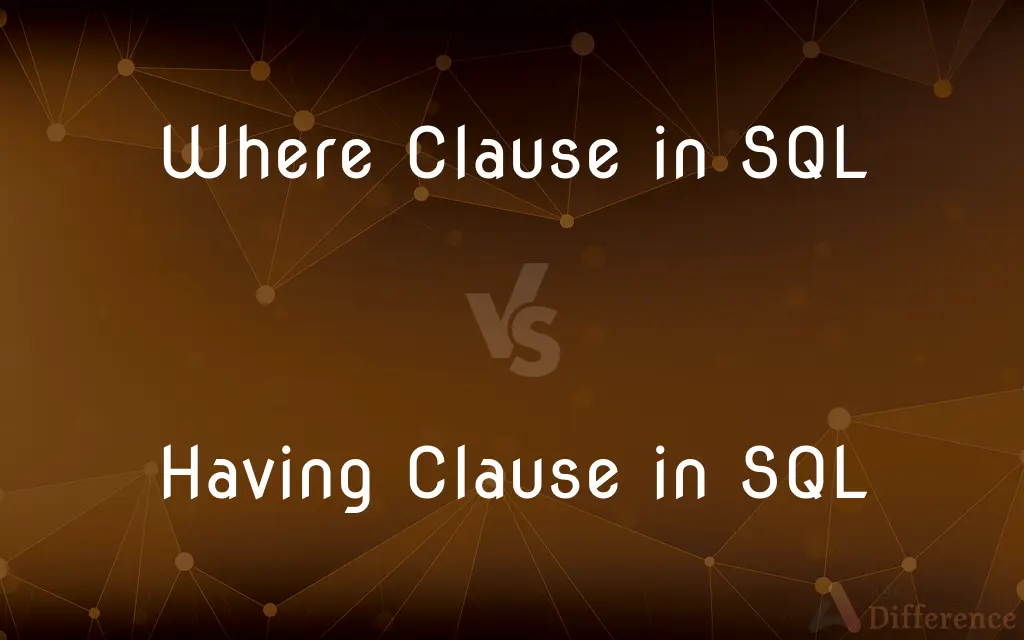Where Clause in SQL vs. Having Clause in SQL — What's the Difference?
By Tayyaba Rehman — Published on January 18, 2024
The WHERE clause in SQL filters rows before grouping, while the HAVING clause filters groups after aggregation.

Difference Between Where Clause in SQL and Having Clause in SQL
Table of Contents
ADVERTISEMENT
Key Differences
The WHERE clause in SQL is a filter that is applied before any grouping takes place. It is used to specify conditions on columns for the rows to be included in the result set. The WHERE clause eliminates rows that do not satisfy the condition set forth, reducing the number of rows that will be processed in the subsequent parts of the query.
The HAVING clause in SQL also acts as a filter but is applied after the aggregation has occurred. It is used in conjunction with the GROUP BY clause to filter groups or aggregates based on a specified condition. Unlike the WHERE clause, HAVING can filter out rows after an aggregation has been performed, making it possible to apply conditions on aggregate functions.
In the context of SQL queries that involve grouping of rows, WHERE and HAVING are both used to filter data, but at different stages of the query execution. The WHERE clause is used before the data is grouped, and the HAVING clause is used after the grouping has been applied.
The use of WHERE clause is for individual row operations, which is why it cannot contain aggregate functions. On the other hand, the HAVING clause is used to filter values from a group, so it can contain aggregate functions like COUNT(), SUM(), AVG(), etc.
Both WHERE and HAVING clauses are integral to SQL for refining query results. While WHERE removes rows that don’t match the condition, HAVING removes groups that don’t match the aggregate condition, shaping the final output of a query.
ADVERTISEMENT
Comparison Chart
Stage of Query
Applied before grouping of rows
Applied after grouping of rows
Function
Filters individual rows
Filters groups or aggregates
Aggregate Usage
Cannot use aggregate functions
Can use aggregate functions
Group By Relation
Used independently or before GROUP BY
Used after GROUP BY when aggregates are involved
Result Set Impact
Determines which rows are included in the group operation
Determines which groups are included in the final result set
Compare with Definitions
Where Clause in SQL
Filters records based on specified conditions.
SELECT * FROM Customers WHERE Age > 30;
Having Clause in SQL
Ensures that only groups meeting the aggregate condition are included.
SELECT Date, SUM(Sales) FROM Orders GROUP BY Date HAVING SUM(Sales) > 10000;
Where Clause in SQL
Applied to individual rows before grouping.
SELECT Name, Age FROM Users WHERE Age >= 18;
Having Clause in SQL
Used only with SELECT statements that include grouping.
SELECT ManagerID, SUM(Salary) FROM Employees GROUP BY ManagerID HAVING SUM(Salary) > 500000;
Where Clause in SQL
Cannot be used with aggregate functions.
SELECT Name FROM Employees WHERE Department = 'Sales';
Having Clause in SQL
Filters the results of aggregate functions.
SELECT Country, AVG(Age) FROM Users GROUP BY Country HAVING AVG(Age) < 30;
Where Clause in SQL
Essential for narrowing down search results in a query.
DELETE FROM Students WHERE GraduationYear < 2020;
Having Clause in SQL
Cannot function independently without GROUP BY.
SELECT Category, COUNT(ProductID) FROM Products GROUP BY Category HAVING COUNT(ProductID) > 5;
Where Clause in SQL
Used in SELECT, UPDATE, and DELETE statements.
UPDATE Orders SET Quantity = 10 WHERE OrderID = 1002;
Having Clause in SQL
Filters groups created by GROUP BY based on aggregate conditions.
SELECT Department, COUNT() FROM Employees GROUP BY Department HAVING COUNT() > 10;
Common Curiosities
Does the HAVING clause require an aggregate function?
Typically, yes, when filtering groups, not individual records.
Can WHERE and HAVING be used together?
Yes, in a grouped query, WHERE filters rows before, and HAVING filters groups after.
Is HAVING clause necessary with GROUP BY?
Only if you want to filter groups based on an aggregate condition.
What can be used instead of HAVING in some cases?
A subquery with a WHERE clause might be used instead of HAVING.
Is the WHERE clause executed before the SELECT clause?
Yes, WHERE is executed before SELECT in terms of filtering data.
Can you use WHERE with JOIN?
Yes, WHERE can be used to filter records in a JOIN.
Which is executed first, WHERE or HAVING?
WHERE is executed before grouping, and HAVING is after.
Can we use WHERE with aggregate functions?
No, aggregate functions cannot be used with WHERE.
Can HAVING be used without GROUP BY?
No, HAVING specifically filters results of aggregate functions post-GROUP BY.
Can I filter a single row with HAVING?
No, HAVING is for filtering groups, not individual rows.
Can WHERE filter based on an alias?
No, aliases are not accessible in WHERE.
Does the order of WHERE and HAVING matter in a query?
Yes, WHERE must come before GROUP BY, and HAVING must come after.
Can HAVING access column aliases?
Yes, HAVING can use aliases provided in the SELECT.
What's the best way to remember the difference between WHERE and HAVING?
WHERE filters before data is grouped, HAVING filters after.
Why doesn't my HAVING clause filter individual rows?
Because HAVING is designed to work on groups created by GROUP BY.
Share Your Discovery

Previous Comparison
Blue Dream vs. Pineapple Express
Next Comparison
SATA vs. eSATAAuthor Spotlight
Written by
Tayyaba RehmanTayyaba Rehman is a distinguished writer, currently serving as a primary contributor to askdifference.com. As a researcher in semantics and etymology, Tayyaba's passion for the complexity of languages and their distinctions has found a perfect home on the platform. Tayyaba delves into the intricacies of language, distinguishing between commonly confused words and phrases, thereby providing clarity for readers worldwide.
















































